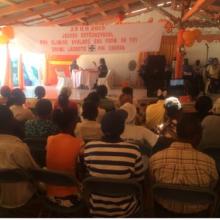PIH Canada will strengthen rights of women and girls and elevate access to health care and psychosocial support for survivors of sexual and gender-based violence (SGBV) in Haiti thanks to new support from Global Affairs Canada.
PIH Canada, in collaboration with our Haitian sister organization Zanmi Lasante (ZL), has been working to treat survivors and reduce SGBV incidence since 2014 across six ZL sites. The new funding, $2-million over three years, will be used to scale up the project across all eleven hospitals and clinics in ZL’s catchment area. The initiative is expected to provide care for up to 1,000 women and girls each year, who otherwise would have had no access to specialized and compassionate care.
“Women are the pillars of family and community in Haiti, and Zanmi Lasante has been working to protect the health and rights of women and girls for more than 30 years,” said Loune Viaud, executive director of Zanmi Lasante. “This support from the Canadian government is a strong statement that women’s rights matter, that sexual assault needs to be taken seriously, and that survivors deserve to be cared for and to be heard.”
Haiti, like many countries, suffers from an epidemic of violence against women and girls: according to one study 28% of women reported experiencing physical violence, and 13% said they have been sexually assaulted. Through this project, staff will provide comprehensive SGBV medical care and improve coordination and engagement of institutions engaged in SGBV issues, including justice, police, community and educational institutions. The project also introduces public education campaigns and community activities designed to increase awareness and understanding of SGBV, and begin shifting attitudes and practices.
“Over the past four years, we’ve heard such powerful stories from women and girls who experienced the trauma of sexual and gender-based violence and then found compassionate care thanks to our Haitian colleagues,” said Mark Brender, National Director of PIH Canada. “We’re thrilled that funding from Global Affairs Canada will allow us to strengthen and scale up the impact of this work.”
Following PIH’s community-based approach to care, the project initiative extends from hospitals and health centres out to the most remote and rural communities. Doctors, nurses and social workers will receive additional training to ensure they are able to properly treat and care for victims of SGBV, provide specialized counselling, and linking survivors to legal assistance and community-based supports. In towns and rural villages surrounding the clinics, ZL is establishing SGBV commissions. These groups bring together representatives from institutions including police, the judiciary, the women’s affairs ministry, local women’s groups, the health system, and child protection to share information on SGBV cases, track incidence, and discuss responses, service improvements, and collaboration between sectors.
As part of Canada’s Feminist International Assistance Policy, PIH Canada is one of 21 small and medium organizations to receive funding for high impact, innovative and sustainable development projects to reduce poverty and build a more peaceful, inclusive and prosperous world.
“By supporting Canada’s small and medium organizations, we are leveraging their strengths and the know-how of civil society to deliver innovative programming in developing countries to help the world’s most vulnerable people, especially women and girls,” said Maryam Monsef, Minister of International Development and Minister for Women and Gender Equality.


